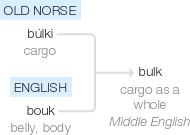Bulk
Middle English: the senses ‘cargo as a whole’ and ‘heap, large quantity’ (the earliest recorded) are probably from Old Norse búlki ‘cargo’; other senses arose perhaps by alteration of obsolete bouk ‘belly, body’.
wiktionary
From Middle English bulk, bolke(“a heap, cargo, hold; heap; bulge”), borrowed from Old Norse búlki(“the freight or the cargo of a ship”), from Proto-Germanic *bulkô(“beam, pile, heap”), from Proto-Indo-European *bʰelǵ-(“beam, pile, prop”). Compare Icelandic búlkast(“to be bulky”), Swedish dialectal bulk(“a bunch”), Danish bulk(“bump, knob”).
Conflated with Middle English bouk(“belly, trunk”).
etymonline
bulk (n.)
mid-15c., "a heap; the volume or bulk of something," earlier "ship's cargo" (mid-14c.), from a Scandinavian source akin to Old Norse bulki "a heap; ship's cargo," from Proto-Germanic *bul-, from PIE root *bhel- (2) "to blow, swell."
Meaning extended by early confusion with obsolete bouk "belly" (from Old English buc "body, belly," from Proto-Germanic *bukaz; see bucket), which led to sense of "size, volume, magnitude of material substance," attested from mid-15c. In bulk 1670s, "loaded loose." Meaning "the greater part" (of anything) is by 1711.
bulk (v.)
"swell, become more massive," 1550s (usually with up), from bulk (n.). Related: Bulked; bulking.
